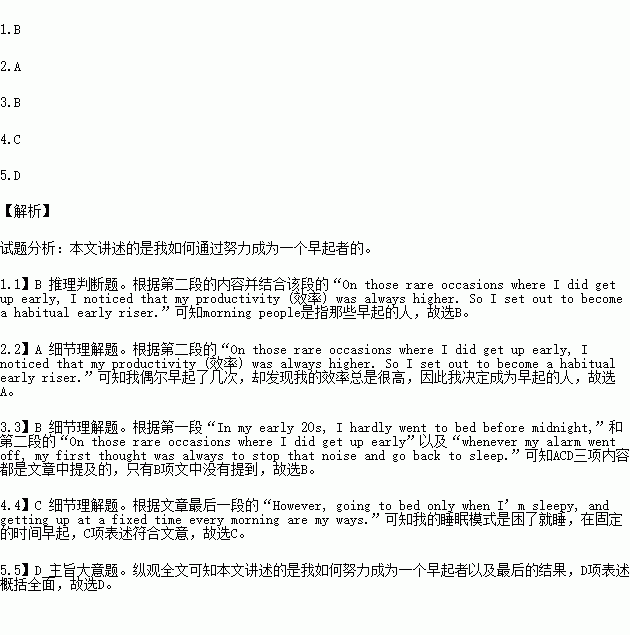题目内容
Are morning people born or made? In my case it was definitely made. In my early 20s, I hardly went to bed before midnight, and I would always get up late the next morning.
But after a while I couldn’t ignore the high relationship between success and rising early. On those rare occasions where I did get up early, I noticed that my productivity (效率) was always higher. So I set out to become a habitual early riser. But whenever my alarm went off, my first thought was always to stop that noise and go back to sleep. Eventually some sleep research showed that my strategy was wrong.
The most common wrong strategy is this: supposing you’re going to get up earlier, you’d better go to bed earlier. It sounds very reasonable, but will usually fail.
There are two main schools (流派) of thought on sleep patterns. One is that you should go to bed and get up at the same time every day. The second school says you should go to bed when you’re tired and get up when you naturally wake up. However, I have found both are wrong if you care about productivity. If you sleep at fixed hours, you’ll sometimes go to bed when you aren’t sleepy enough. You’re wasting time lying in bed awake.
My solution is to combine both methods. I go to bed when I’m sleepy and get up with an alarm clock at a fixed time. So I always get up at the same time (in my case 5 a.m.), but I go to bed at different times every night.
However, going to bed only when I’m sleepy, and getting up at a fixed time every morning are my ways. If you want to become an early riser, you can try your own.
1. According to the passage, the underlined phrase refers to ________.
A. people who stay up until the next morning
B. people who get up early in the morning
C. people who feel sleepy in the morning
D. people whose productivity is the lowest in the morning
2. Why did the author want to become a habitual early riser?
A. Because he / she found that the productivity was higher.
B. Because he / she wanted to do morning exercise.
C. Because he / she wanted to test which school is better.
D. Because he / she wanted to have more sleep time.
3.The author experienced all the following EXCEPT ________.
A. going to bed after midnight
B. asking scholars for advice on sleeping habits
C. getting up early occasionally
D. pressing off the alarm to go on sleeping
4. What’s the author’s sleep pattern?
A. Going to bed early and getting up early.
B. Going to bed late and getting up late.
C. Going to bed when sleepy and getting up at a fixed early time.
D. Going to bed early and getting up late.
5. The passage is mainly about ________.
A. main schools of thought on sleep patterns
B. how to have a good sleep
C. wrong strategies for getting up early
D. how to become an early riser
 名校课堂系列答案
名校课堂系列答案——Your argument is .I will not let you pass.
--Are you kidding?
A.sound B. rational
C. liberal D. plain
基础写作
【写作内容】
根据以下所给的信息,介绍苹果公司的最新产品苹果智能手表。
产品名称:苹果牌智能手表 外形特点:它被视为戴在手腕上的小型计算机, 采用了蓝宝石屏幕与Force Touch触摸技术,有银色、金色、红色和白色等多种颜色供选择。 功能:可以发邮件、短信、支付网购产品和导航;智能手表还可以监控佩戴者的健康状况和强壮程度。如果想使用智能手表的大部分功能,最好与iPhone同时使用。 价格:$349~$10,000 购买信息:4月10号接受预定,4月24号在美国及其他8个国家出售。 |
参考词汇:蓝宝石屏幕 Sapphire screen 预定 pre-order 导航navigation services
【写作要求】
只能用5个句子表达全部内容。
【评分标准】
句子结构准确,信息内容完整,篇章连贯。
_____________________________________________________________________________
_____________________________________________________________________________
_____________________________________________________________________________

